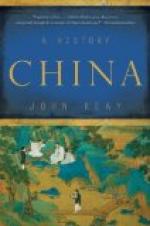The new “small gentry” did not consist of great families like the original gentry. When, therefore, people of that class wanted to play a political part in the central government, or to gain a position there, they had either to get into close touch with one of the families of the gentry, or to try to approach the emperor directly. In the immediate entourage of the emperor, however, were the eunuchs. A good many members of the new class had themselves castrated after they had passed their state examination. Originally eunuchs were forbidden to acquire education. But soon the Ming emperors used the eunuchs as a tool to counteract the power of gentry cliques and thus to strengthen their personal power. When, later, eunuchs controlled appointments to government posts, long established practices of bureaucratic administration were eliminated and the court, i.e. the emperor and his tools, the eunuchs, could create a rule by way of arbitrary decisions, a despotic rule. For such purposes, eunuchs had to have education, and these new educated eunuchs, when they had once secured a position, were able to gain great influence in the immediate entourage of the emperor; later such educated eunuchs were preferred, especially as many offices were created which were only filled by eunuchs and for which educated eunuchs were needed. Whole departments of eunuchs came into existence at court, and these were soon made use of for confidential business of the emperor’s outside the palace.
These eunuchs worked, of course, in the interest of their families. On the other hand, they were very ready to accept large bribes from the gentry for placing the desires of people of the gentry before the emperor and gaining his consent. Thus the eunuchs generally accumulated great wealth, which they shared with their small gentry relatives. The rise of the small gentry class was therefore connected with the increased influence of the eunuchs at court.
7 Literature, art, crafts
The growth of the small gentry which had its stronghold in the provincial towns and cities, as well as the rise of the merchant class and the liberation of the artisans, are reflected in the new literature of Ming time. While the Mongols had developed the theatre, the novel may be regarded as the typical Ming creation. Its precursors were the stories of story-tellers centuries ago. They had developed many styles, one of which, for instance, consisted of prose with intercalated poetic parts (pien-wen). Buddhists monks had used these forms of popular literature and spread their teachings in similar forms; due to them, many Indian stories and tales found their way into the Chinese folklore. Soon, these stories of story-tellers or monks were written down, and out of them developed the Chinese classical novel. It preserved many traits of the stories: it was cut into chapters corresponding with the interruptions which the story-teller made in order to collect money; it was interspersed




